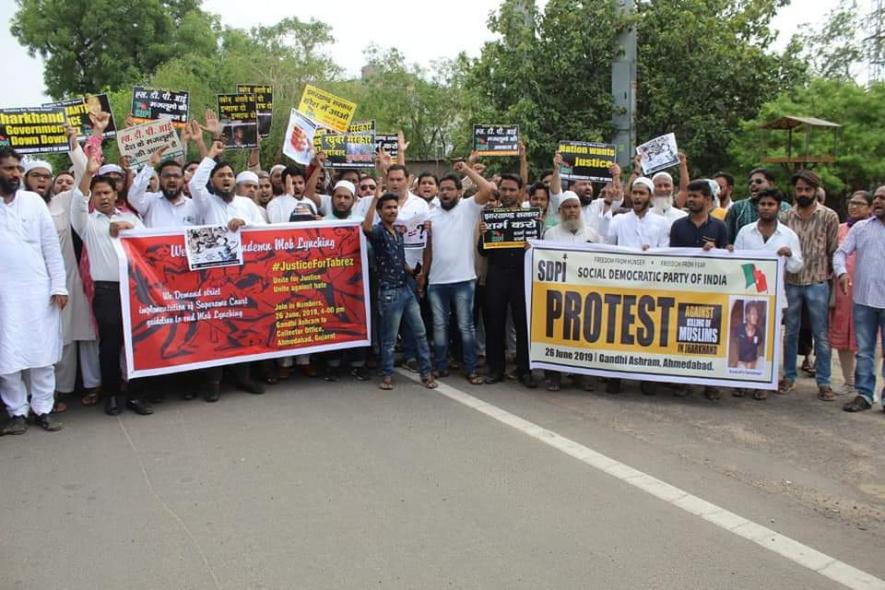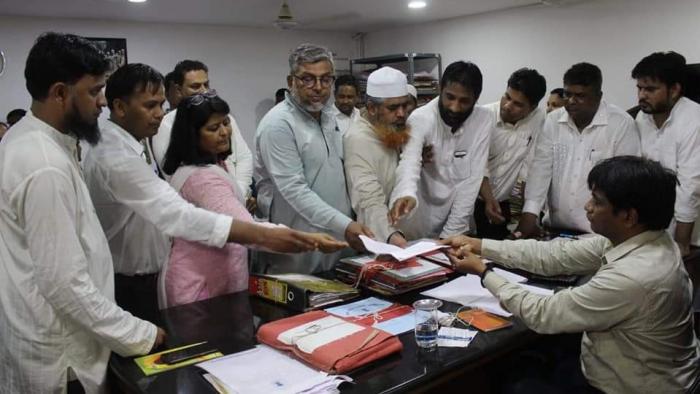Jharkhand Lynching: Protests in Several Parts of Gujarat

Activists of Alp Sankhyak Adhikar Manch, a Gujarat-based minority rights organisation, Falahul Muslemin, a Kutch-based minority rights group, Social Democratic Party of India (SDPI), Jamaiyat-Ulema-e Hind (Arshad Madni) Legal Cell of Gujarat, Jan Sangharsh Manch and other rights organisations came together to hold protests against the lynching of Tabrez Ansari in Jharkhand, who was thrashed by mob on suspicion of being a thief and later succumbed to injuries.
Protestors, including artistes, advocates, human rights activists, gathered in multiple districts of Gujarat, including Ahmedabad, Vadodara, Kutch, Rajkot, Junagadh, Sabarkantha, Arvalli and Mahisagar, and walked, holding placards that said, “No more lynching in the name of religion”.
Following the protests, a memorandum was submitted to the Collector of Ahmedabad demanding justice for Ansari, financial support for his 19-year-old wife and an assurance from the Gujarat government that it will do everything in its capacity to implement the Supreme Court’s guideline on dealing with mob lynching.

Noticeably, the Supreme Court in July last year, taking cognizance of the trend of mob lynching in the country, had passed directives to states regarding preventive, remedial and punitive measures in respect to mob lynching. The Supreme Court had proposed a special law to deal with mob lynching and a special nodal officer (not below the rank of Superintendent of Police) to be appointed in each district to curb the threat of the same. The Court had also held that a special court should be formed for the trial of the mob lynching cases to fast track the cases.
In September last year, the Supreme Court had passed an order directing all the states to comply with the above directives within a month.
However, state governments are yet to comply with Supreme Court’s order as incidents of lynching continue unabated across the country, the latest being the killing of 24-year-old Ansari in Saraikela Kharsawan, Jharkhand.
“Incidents of mob lynching doesn’t seem to stop in our country. As per Article 21 of the Constitution, no person shall be deprived of his or her life or personal liberty. The killings in the name of the religion are a violation of that right ensured to us by the constitution,” Sophia Khan, an Ahmedabad-based human rights activists told Newsclick.
“Gujarat has also witnessed mob lynching -- Mohammed Ayub died in 2016 and later women were attacked in Valsad district. The state government should assure security of not only Muslims and dalits but all its citizens as we are all vulnerable. Nobody knows when a person will fall victim to a mob,” added Khan.
“As per Supreme Court’s guideline, a special court should be formed for the trial of the case of murder of Tabrez Ansari and justice should be served in a month’s time. The family should be given compensation of at least Rs 1 crore,” said advocate Shamshad Pathan in a statement representing human rights activists of the state.
Get the latest reports & analysis with people's perspective on Protests, movements & deep analytical videos, discussions of the current affairs in your Telegram app. Subscribe to NewsClick's Telegram channel & get Real-Time updates on stories, as they get published on our website.
























